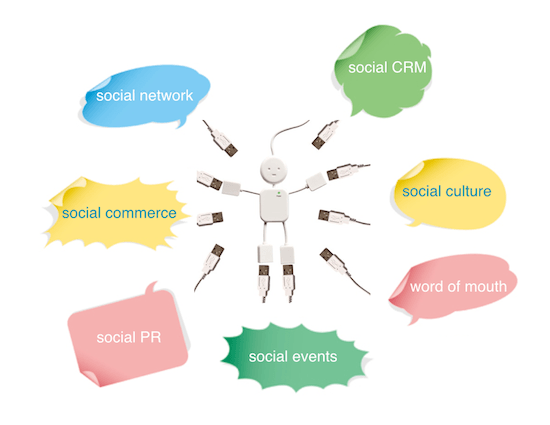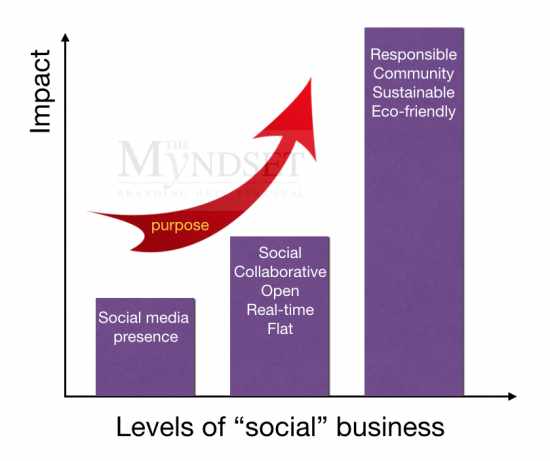One of the big buzz words being thrown about by the digirati (aka intelligentsia of digital marketing) and social media marketing mavens is the concept of a social business. Among the bigger groups, IBM and the Dachis Group seem to be deking it out on claiming the social business space. But, if you are like me, you might be asking what exactly is a social business? Maybe you might even be curious to know if there is a unifying theory?
What the fruits is a social business?
In terms of defining social business, there are two veins. Taking the high road, a social business is about creating a “new kind of capitalism that serves humanity’s most pressing needs.” Put on the map by the Nobel Peace Prize winner, Muhammad Yunus, who wrote “Building Social Business,” a social business is a business with a noble cause. Accordingly, the central tenet is not about making profits, but putting the business at the service of a higher purpose.
Social in media

Meanwhile, the rise of Yunus’ “social business” coincided with the rise of social media. All of sudden, a social business was also a company that had launched itself into social media. Moreover, the very notion of social media became confused, if not interchangeable, with social networks. The nature (and definition) of social media has evolved, to encompass activities such as blogging, sharing, checking in, participating in a forum… According to Fred Cavazza, who just published (in French) his first book entitled “Social Business,” there are presently 10 types of different social media. I think that it makes less and less sense to try to put the different social media into categories to the extent that each media has a tendency to swap and switch with great agility. Take, for example, Burbn (geolocalization meets game) which became the photo sharing Instagram. In any event, being social in media is, at its core, about listening, conversing and exchanging. {Please feel free to click to Tweet}
Social in business
Taking the presence in social media to the next level requires mobilizing the troops. It is one thing to open a Twitter account. It’s another to have a burgeoning and vibrant conversation and following on the social network. Being social in business means creating a more collaborative spirit. In terms of tools, it would be appropriate to have a robust internal social network (à la Chatter or Yammer…), where employees feel empowered and, even rewarded, for openly sharing data and expertise, in real time. When organizations embrace the socialness of a social business, walls around departments and divisions must start to come down. Hierarchies must flatten to improve agility and fluidity in communication. {Click to Tweet} As a business becomes more “social,” the imperative is to become more transparent. As a necessary result, it also means being more authentic. Bottom line, when a company onboards the social in social business, it typically requires a rather radical transformation of its mindset and culture.

The purpose
So, is there a tangible link between a business that has properly embraced social media and business that is serving “humanity’s most pressing needs”? The answer to that question is firmly lodged in the word humanity. I wrote in 2008 about how there was a strong connection between the web 2.0 mindset and the underlying tenets of sustainable development. The common link is the people. For a message to resonate on social media, generally, there must be an emotional connection of some sort. The most shareable content is either funny, shocking or meaningful. For a brand to “get” social, sometimes there is literally a Khyber Pass of the internal culture to cross. In effect, social business must allow for the personality to flourish. And, for businesses that are hell bent for leather on performance and short-term profits and that do not accommodate imperfections or a sense of humor, they will struggle immensely to gain traction as a social business. When your brand is Patagonia and you explicitly discourage relentless consumerism, your message has a purpose and this facilitates people’s desire to listen and share your message. If your brand is cold, institutional and/or overly product-centric, it is bereft of sociality, not to say a believable personality.

Social business + purpose = impact
As a brand or company moves along in terms of maturity towards having an effective social [media] strategy and a social culture, the real lever becomes its purpose. This is what I tend to call finding one’s North. The brand’s social presence will have a much better chance at gaining traction if it serves a higher mission. Corporate Social Responsibility (CSR) is a part of the social business venacular, but the where the [recycled] rubber hits the road is in the actions taken, not the prose in an annual report. And leadership must play a critical role in both leading by example within the social media as well as embodying the spirit and purpose of the business. A truly social business requires a special individual at its head, to encarnate the values and behaviors that make a social business succeed.
If you have a CEO without charisma or isn’t a person that you would like to invite to your dinner table, better not try social business {Click to tweet!}
Branding gets personal
At its core, this is why I have long clamored that branding must get more personal. For a brand to exist effectively in forums, social networks or on blogs, the form is conversation and trust is the currency. {Tweet this!} Someone has to be manning those keyboards and the more the humanity of that person is able to shine through, I would argue that the chances of moving from a social wannabe to a successful social business are magnified. {Please do click to tweet}
Your thoughts and reactions are welcome, as ever!











Great post Minter! I think the focus should be more on how different departments can best use social media tools & technologies, more than how can departments be more “social”…
Hi – Great post. I love reading about using business to be more social and in doing so giving back to humanity (rather than the take mentality we seem to have fostered for the last 200 years). I’ve created the concept of the business HUG. It’s nice because actual hugs are a mutual exchange of affection and require trust. Also its hard to give an authentic hug and not get one straight back. HUG as I use it stand for Hear Understand and Give back incredible value. Something that businesses can do on and off line to their customers and the wider community. You can find out more on my website.